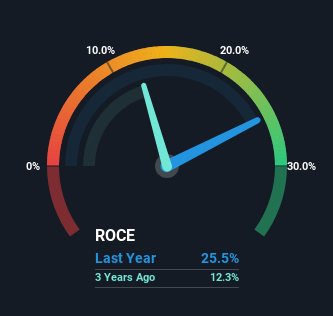- Malaysia
- /
- Specialty Stores
- /
- KLSE:BAUTO
Capital Allocation Trends At Bermaz Auto Berhad (KLSE:BAUTO) Aren't Ideal

If you're looking for a multi-bagger, there's a few things to keep an eye out for. Ideally, a business will show two trends; firstly a growing return on capital employed (ROCE) and secondly, an increasing amount of capital employed. This shows us that it's a compounding machine, able to continually reinvest its earnings back into the business and generate higher returns. Looking at Bermaz Auto Berhad (KLSE:BAUTO), it does have a high ROCE right now, but lets see how returns are trending.
Understanding Return On Capital Employed (ROCE)
Just to clarify if you're unsure, ROCE is a metric for evaluating how much pre-tax income (in percentage terms) a company earns on the capital invested in its business. To calculate this metric for Bermaz Auto Berhad, this is the formula:
Return on Capital Employed = Earnings Before Interest and Tax (EBIT) ÷ (Total Assets - Current Liabilities)
0.26 = RM312m ÷ (RM2.0b - RM744m) (Based on the trailing twelve months to July 2024).
Thus, Bermaz Auto Berhad has an ROCE of 26%. That's a fantastic return and not only that, it outpaces the average of 12% earned by companies in a similar industry.
Check out our latest analysis for Bermaz Auto Berhad

In the above chart we have measured Bermaz Auto Berhad's prior ROCE against its prior performance, but the future is arguably more important. If you'd like to see what analysts are forecasting going forward, you should check out our free analyst report for Bermaz Auto Berhad .
What The Trend Of ROCE Can Tell Us
On the surface, the trend of ROCE at Bermaz Auto Berhad doesn't inspire confidence. To be more specific, while the ROCE is still high, it's fallen from 36% where it was five years ago. Meanwhile, the business is utilizing more capital but this hasn't moved the needle much in terms of sales in the past 12 months, so this could reflect longer term investments. It may take some time before the company starts to see any change in earnings from these investments.
While on the subject, we noticed that the ratio of current liabilities to total assets has risen to 38%, which has impacted the ROCE. Without this increase, it's likely that ROCE would be even lower than 26%. While the ratio isn't currently too high, it's worth keeping an eye on this because if it gets particularly high, the business could then face some new elements of risk.
The Bottom Line
To conclude, we've found that Bermaz Auto Berhad is reinvesting in the business, but returns have been falling. Unsurprisingly, the stock has only gained 35% over the last five years, which potentially indicates that investors are accounting for this going forward. Therefore, if you're looking for a multi-bagger, we'd propose looking at other options.
On a final note, we found 2 warning signs for Bermaz Auto Berhad (1 is concerning) you should be aware of.
If you want to search for more stocks that have been earning high returns, check out this free list of stocks with solid balance sheets that are also earning high returns on equity.
Valuation is complex, but we're here to simplify it.
Discover if Bermaz Auto Berhad might be undervalued or overvalued with our detailed analysis, featuring fair value estimates, potential risks, dividends, insider trades, and its financial condition.
Access Free AnalysisHave feedback on this article? Concerned about the content? Get in touch with us directly. Alternatively, email editorial-team (at) simplywallst.com.
This article by Simply Wall St is general in nature. We provide commentary based on historical data and analyst forecasts only using an unbiased methodology and our articles are not intended to be financial advice. It does not constitute a recommendation to buy or sell any stock, and does not take account of your objectives, or your financial situation. We aim to bring you long-term focused analysis driven by fundamental data. Note that our analysis may not factor in the latest price-sensitive company announcements or qualitative material. Simply Wall St has no position in any stocks mentioned.
About KLSE:BAUTO
Bermaz Auto Berhad
An investment holding company, distributes and retails of new and used Mazda, Peugeot, Kia, and XPeng vehicles in Malaysia and the Philippines.
Undervalued with excellent balance sheet and pays a dividend.
Market Insights
Community Narratives


